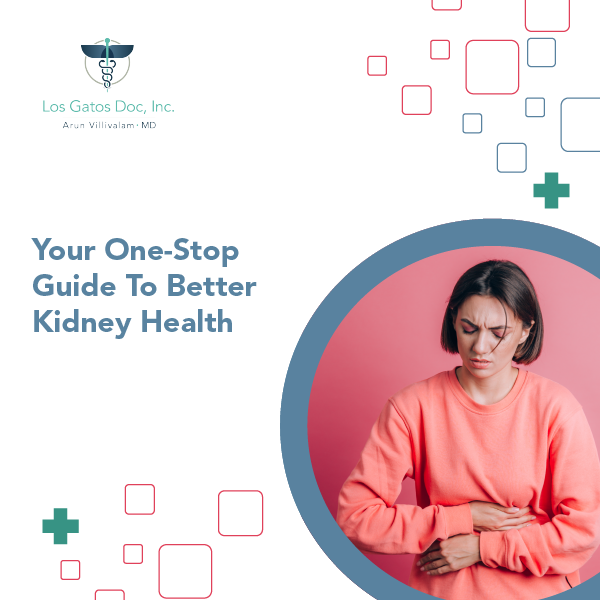You may not think about your kidneys, but they play a vital role in your overall health.
Did you know that over 1 in 7 American adults are estimated to have chronic kidney disease? And out of those that have kidney disease, 9 out of 10 don’t even know they have it.
This means millions of people are suffering from kidney disease and don’t even know it. When most of these symptoms show up, your kidneys are already damaged.
Understanding kidney health allows you to make informed decisions about your kidney care and reduces your chances of serious health problems.
Learn more about your kidneys and how to take care of them in this article.
Know Your Kidneys
Your kidneys, each just the size of a computer mouse, function as an amazing filter.
They are a powerful chemical factory, with the following major functions:
- Filter all the blood in your body every 30 minutes
- Remove wastes, toxins, excess fluids, and some drugs like NSAIDs
- Releases hormones that regulate your blood pressure
- Stimulate the production of red blood cells
- Convert Vitamin D from supplements or sunlight into an active form of vitamin D, which keeps your bones strong and healthy
- Balances blood chemicals or minerals like sodium, calcium, potassium, and phosphorus that are essential to life.
When you have damaged kidneys, you could have a serious condition called chronic kidney disease (CKD). Damaged kidneys are incapable of filtering blood efficiently. The wastes and excess fluids in the body may cause other health problems, such as cardiovascular disease.
The health complications of chronic kidney disease are serious, including:
- Anemia
- Increased infections
- Low calcium levels, high potassium and phosphorus levels in the blood
- Loss of appetite
- Depression
- Kidney failure
- Early cardiovascular disease
What are the symptoms of kidney disease?
Early kidney disease usually has no symptoms. So, we check for the common risk factors of kidney disease.
Talk to your doctor and get tested for kidney disease if you have any of these risk factors.
- Over 60 years
- Diabetes
- High blood pressure
- Heart disease
- Family history of kidney failure
- Obesity
Getting tested is the best way to know your kidney health. While you may be afraid to learn how your kidneys are functioning, being informed about your kidney health means you can take the right steps to protect them.
We usually have specific blood and urine tests for diagnosing CKD. They include measuring the creatinine level in the blood and protein levels in the urine. Your doctor can develop a personalized care plan for you based on the test reports.
What does it feel like when your kidney deteriorates?
If you pay close attention, your body will show subtle signs of kidney disease, as your kidneys deteriorate, such as:
Change in urine: You could use the bathroom more or less than usual. It could also be changed in the volume. So maybe you’re going to the restroom more frequently, but there’s less urine produced. It can also mean a change in color or texture. Some patients report that their urine looks foamy. If you’re experiencing foamy urine, it means that you’re leaking protein. It’s easy to write off changes in urine as normal and blame it on your diet. But if the change in urine has become the new norm, that’s a warning sign that something might be wrong with your kidneys.
Feeling fatigued: You may experience physical and mental exhaustion. So something that you could do easily before has now become a little more difficult, or you’re a little more tired from it. This could be a sign of kidney disease. If you notice that your ability to focus or really be able to pay attention for long periods of time, or you’re finding yourself distracted or just not as mentally sharp as you were before, again, it can be a sign of kidney disease. This is easy to write off as being a sign of aging, lack of sleep, and other such factors. If you’re feeling constantly fatigued despite sleeping and eating well, you could have kidney disease.
Edema: It means you have extra fluid in your body because your kidneys aren’t able to draw that from your blood and get rid of it. So we usually notice the first signs of edema around your ankles, feet, fingers, and eyes. Your eyelids will be puffy, looking like they’re thicker than usual. This sign can be easy to ignore and commonly attributed to factors like having too much salt, or not sleeping well. Here’s a little test you can do to check if there is extra fluid in your body. Take your thumb and push on that spot where you feel that you have extra fluid. Now, push down hard and let it hold there for a little bit. When you lift your thumb up, and you see a little dip that’s still imprinted on your skin, then you’re definitely holding on to too many fluids in your body.
Changes in your skin: Usually it feels dry and itchy, maybe even a little scaly. It can also mean you’re getting a little more pale or gray or your skin is yellow. Again, this sign is easy to ignore as nothing serious as most think the solution is a moisturizing lotion or shampoo. But when these changes in your skin are persistent, you could have kidney disease.
Bad breath and taste in the mouth: You could experience bad breath or taste in your taste. It’s easy to ignore this symptom and attribute it to poor dental hygiene or something that you’ve eaten. But if you have persistent bad breath or taste in your mouth, it may indicate kidney disease.
Changes in weight: One of the signs of kidney disease is weight gain because of the extra fluids. But another subtle sign is weight loss. You might feel nauseous and have a loss of appetite. Because there’s a loss of appetite, you might consider that as the cause of your weight loss, when in fact, it may be a sign of kidney disease.
How to have healthy kidneys?
First off, a kidney is an organ that you cannot live without. While treatment options like dialysis and transplant are life-saving and necessary, they’re not a cure. Nothing will work better than your original kidneys. That’s the reason you should try to prolong the functioning of your original kidneys.
By making a few healthy lifestyle changes and managing existing conditions, you may slow the progression of kidney disease.
- Make healthy food choices:
- We stress following a low-salt diet because that will reduce your blood pressure. And whatever the cause of your kidney disease, keeping your blood pressure normal is incredibly important.
- The other foods and drinks to consider are those that are high in antioxidants, vitamin C, vitamin E, and calcium because those are also very good for your blood vessels, and help keep your blood pressure low.
- Drinking beetroot juice, which contains a lot of nitrous oxide, is a good choice as it dilates your blood vessels and will reduce your blood pressure.
- We suggest eating sensibly by having a moderate amount of lean protein from diverse sources. We suggest avoiding a high-protein diet as the high protein intake puts great stress on the kidneys.
- If you have diabetes, controlling your sugars well is of paramount importance, and looking after yourself.
- Be physically active: Though exercise doesn’t help directly to prevent kidney disease, it helps control blood pressure and blood sugars well. As obesity is a risk factor for CKD, maintaining a healthy weight can help in improving kidney health. Try to exercise for 30 minutes daily, at least three days a week.
- Go for regular checkups: Are you wondering how often should you get your kidneys checked? If you have diabetes, get checked every year. If you have high blood pressure, heart disease, or a family history of kidney failure, talk with your healthcare provider about how often you should get tested. You should also have your blood pressure checked regularly as it can be a sign of kidney disease. Consult your healthcare team regularly and follow their treatment plan diligently.
Find the best treatment plan for your kidney health
At Los Gatos Doc, we are changing the way our team understands, treats, and prevents kidney disease. There are new paths that allow us to provide better treatments tailored to the type of CKD and to the individual.
No matter the treatment path, being an active participant in your care is important. Every choice you make to improve your kidney health can also help you manage your overall health. If a part of your treatment plan no longer works, or if your kidney condition gets worse, let your doctor know about it. Discuss other treatment paths you can take to get back on track.
Kidneys play a vital role in keeping you healthy, so it’s important to take care of them. Talk to your healthcare provider about your kidney health. Have the tests done because kidney disease is something that can be stopped and prevented?
(Disclaimer: We routinely draw upon public health resources to inform our write-ups. Information in this article may be drawn up from multiple public health sources, including:
- Centers for Disease Control & Prevention
- Medline Plus
- National Institutes of Health
- American Medical Association
- American Association of Family Physicians
- Mayo Clinic
- Family Doctor






